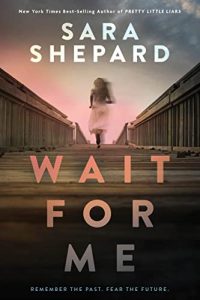Colleen Mondor Reviews Jonathan Abernathy You Are Kind by Molly McGhee and Emily Wilde’s Map of the Otherlands by Heather Fawcett
 Jonathan Abernathy You Are Kind, Molly McGhee (Astra House 978-1662602115, $24.95, hc, 304pp) October 2023.
Jonathan Abernathy You Are Kind, Molly McGhee (Astra House 978-1662602115, $24.95, hc, 304pp) October 2023.
On the fourth page of Molly McGhee’s debut novel, the titular character Jonathan Abernathy is described as a young man drowning in financial debts. They primarily include ‘‘(1) a series of unpaid credit cards inherited after the death of his parents’’ and ‘‘(2) the legal culminations of the decisions he made as a 17-year-old kid, also known as private, American nonsubsidized loans with an APR so lethal it can kill in a week.’’ Readers will be forgiven if, like me, they momentarily pause on page four to verify that they are indeed reading science fiction and not a realistic drama of modern American life. (A quick internet search on debt brings up this February 2023 Washington Post headline: ‘‘He took out a student loan in 1977. Decades later, he’s barely cracked the principal.’’)
In the case of Abernathy, his student loan is presently $250,000 and his inherited debt (which the author notes is illegal, but still finds him pursued by debt collectors), is in the ‘‘low six figures.’’ Altogether, the debts have made his life a series of impossible choices about whether to pay his loans, pay his rent, or buy food. He has terrible low-paying jobs, no hopes for romance or family, and no friends. More importantly, Abernathy has, by his own assessment, little hope of ever being freed from the crushing anxiety the debts have piled upon him. This is why he is delighted, nay thrilled, to visit the bland strip mall office of the Archival Office 508, where he has been promised that forgiveness of loans can be found. The promise came from two people who visited him in a dream, which is a bit outrageous, but what can a person in Abernathy’s position be expected to do? The dream visit was enough to convince this reader that Jonathan Abernathy You Are Kind is, for sure, a science fiction novel. Like the best of the genre, it is also disturbingly close to real life, and while I have read other reviews that found it warm and sometimes humorous, that strong thread of realism made it seem to me much more like horror. Terrifying things happen to Abernathy, and the tragedy is that none of them are truly surprising.
The Archival Office is tasked with sending ‘‘auditors’’ into the dreams of nonproductive employees, where they are to uncover the sources of the nightmares plaguing their sleep so that their superiors can arrive and, literally, vacuum them up. The better an employee sleeps, the more productive they can be on the job! And productive workers equals bountiful profits for the company! It’s all good!
Of course, readers might wonder where the nightmares go, but that is a mystery no one seems to worry about, with the exception of Abernathy’s superior Kai, who is also furious at his poor ability to correctly analyze dreams and his conviction that everything they are doing is for the good of others. Kai hints at the nefarious goals of the Archival Office and its corporate clients to Abernathy who, even though he’s thrilled with his paycheck, cannot help but fret about the people who have no idea they are the subject of dream invasions. The impact of the office’s work is brought home to him when he begins to spend more time with his neighbor, Rhoda, and her charming daughter. Rhoda’s dreams are rooted in tragedy, but once they are cleared, she becomes a shadow of herself, and Abernathy must face the devastation wrought by his employer and his own complicit willingness to sacrifice anything – or anyone – to clear his crushing debt.
Jonathan Abernathy You Are Kind is about the sort of particular desperation that unrepentant greed wreaks on a society. (I haven’t even told you where the nightmares go – I’ll let you discover that on your own.) One way or another, everyone is suffering in this book, even the manager of the hot dog stand where Abernathy works part time and his landlady Kelly, who falls victim to an eviscerating episode of auditing. McGhee is making a statement about immoral capitalism that hits like a sledgehammer, and all of Abernathy’s wry observations and sweet pursuit of Rhoda cannot dull this novel’s pain. It’s a unique, timely, and inordinately effective book. Consider it a warning cry against a potentially grim future; if we are smart, we will listen and make sure that Abernathy’s world is one that never comes to pass.
 Emily Wilde’s Map of the Otherlands, Heather Fawcett (Del Rey 978-0-59350-019-4, $28.00, 339pp, hc) January 2024.
Emily Wilde’s Map of the Otherlands, Heather Fawcett (Del Rey 978-0-59350-019-4, $28.00, 339pp, hc) January 2024.
Author Heather Fawcett returns to her version of 1910 Cambridge with a new adventure of wit and whimsy in Emily Wilde’s Map of the Otherlands. As a faculty member of the Dryadology Department, Emily is committed to her research and writing on faerie, something she accomplished under the most trying of circumstances in the first book of the series, Emily Wilde’s Encyclopaedia of Faeries. The situation is even more dangerous for the intrepid academic this time around as her fellow professor and love interest Wendell Bambleby, who also happens to be an exiled faerie king, is under renewed attack from his diabolical stepmother (who murdered his entire family). To make matters worse, their professional reputations are facing increased scrutiny from a persnickety superior, which threatens Emily’s professorship. With terrifying faerie assassins descending on campus, they have no choice but to take to the road in search of a way to send Wendell back home so he can take the battle to his stepmother. On top of everything else, Emily has to decide if she will accept his marriage proposal, something easier said than done as mortal-faerie matches are not always made in heaven.
Can they get to the bottom of a dryadology mystery and find the door to Wendell’s home? Will they successfully evade/battle/defeat the assassins? Will Emily’s faerie dog Shadow accidentally eat an innocent bystander? Will their academic rival Dr. Farris Rose successfully foist himself onto their travels? Can Wendell convince Emily that true love prevails? And most important: how many descriptions of mouth-watering meals will Fawcett put into the narrative before readers are driven to their own kitchens in sheer desperation?!
The answer to all these questions is that it’s all jolly fun and many things happen and yes, Shadow does cross a bit of a line but no permanent harm is done, I promise. Fawcett firmly nails down the cozy-faerie-adventure-romance-brilliant banter genre here and revels this go-round in taking her characters out again into the European countryside (this time Austria) for more episodes of Emily’s discoveries and note-taking and Wendell’s complaints about the weather mixed with the occasional decapitation of monsters. It’s all quite civilized, except for the moments when something shows up to kill Wendell (and anyone else), and Emily’s determination to find the door while also working on her Otherlands map regardless of sudden terrors is both impressive and hilarious. Rose proves to be a welcome addition, both for his scholarly contributions and acid comments and Emily’s niece, a student at Cambridge who serves as her assistant, is as a comic foil to her more staid aunt which lightens the mood when things get a bit dicey.
Overall, Emily Wilde’s Map of the Otherlands is more of the same sort of fun as the first book, full of quips and snark and much mucking about the perilous countryside (in the rain!). There is also Wendell’s cat who is, in my opinion, worth the price of purchase all on his own. I smiled reading this book and I value the happiness brought by that smile quite highly. Don’t underestimate what Heather Fawcett is doing with the Emily Wilde series, or why we all need it so very much.
This review and more like it in the December and January 2023 issue of Locus.
 While you are here, please take a moment to support Locus with a one-time or recurring donation. We rely on reader donations to keep the magazine and site going, and would like to keep the site paywall free, but WE NEED YOUR FINANCIAL SUPPORT to continue quality coverage of the science fiction and fantasy field.
While you are here, please take a moment to support Locus with a one-time or recurring donation. We rely on reader donations to keep the magazine and site going, and would like to keep the site paywall free, but WE NEED YOUR FINANCIAL SUPPORT to continue quality coverage of the science fiction and fantasy field.
©Locus Magazine. Copyrighted material may not be republished without permission of LSFF.






